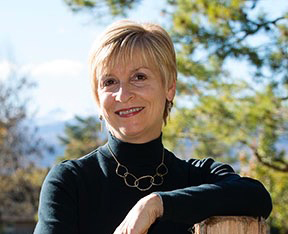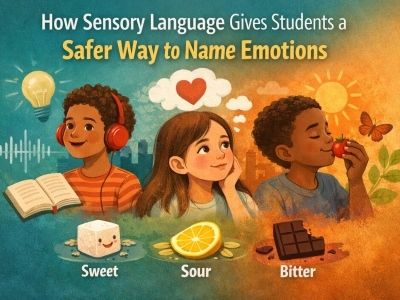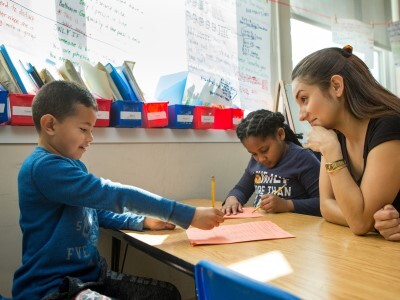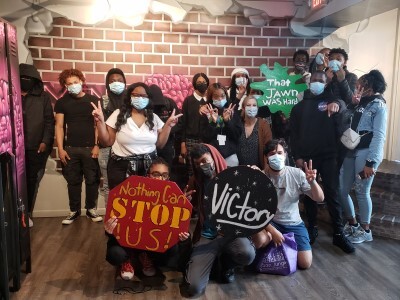Share Your DC: A Diversity, Equity, & Inclusion Expedition
Topics
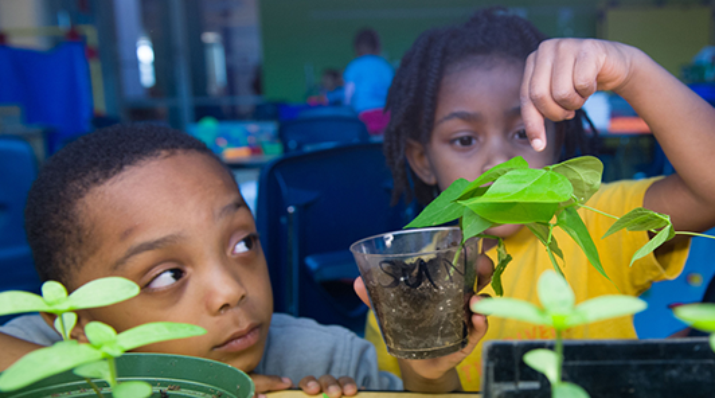
Together, educators are doing the reimagining and reinvention work necessary to make true educational equity possible. Student-centered learning advances equity when it values social and emotional growth alongside academic achievement, takes a cultural lens on strengths and competencies, and equips students with the power and skills to address injustice in their schools and communities.
Practitioner's Guide to Next Gen Learning
“Share Your DC” is a series of events at Two Rivers Public Charter School, where staff and parents grapple with how to create a strong, diverse community where members can truly connect across difference.
Two Rivers, a network of EL Education schools—two elementary and one middle school—in Washington, D.C., is a member of the NGLC and Center for Innovation in Education Assessment for Learning Project community. As part of Two Rivers’ real-world approach, students experience learning opportunities, called expeditions, in which they grapple with compelling, open-ended problems.
So it’s not surprising that when school leaders perceived a challenge confronting their community, they turned to the same problem-solving model. This time, however, the learners were adults. Now gearing up for its fourth cohort, “Share Your DC” is a series of community-building events, a kind of expedition for adults, both educators and parents. Over the course of three evenings, Two Rivers educators invite staff and parents to grapple with their own complex problem: how to create a strong, diverse community where members can truly connect across difference.
For this edition of Friday Focus: Practitioner’s Guide to Next Gen Learning, we spoke to Khizer Husain, Chief of Staff at Two Rivers, to learn about this innovative approach to building a strong, diverse community. In particular we discussed:
What prompted the Share Your DC program
How SYDC mirrors student expeditions and reflects Two Rivers’ values
What participants and Two Rivers educators are learning from the experience
Parents are attracted to our schools because they are diverse, but then there is this ironic bit: they themselves often miss out on opportunities to connect across difference.
—Khizer Husain, Two Rivers Public Charter School
It Starts with a Big, Sticky Problem
“It was the summer of 2016,” Khizer recalls, and the media was full of “back-to-back coverage of bad news and violence: shootings of unarmed black men, the attack in the nightclub in Orlando, one tragic loss after another. It was dragging people down.” During a conversation about what they were seeing in the broader community and the effect it was having on their own, Khizer and Two Rivers’ Executive Director, Jessica K. Wodatch, decided to act. Or, as Khizer puts it, “We realized that if we wanted to move forward, we had to take a step, no matter how small.”
Khizer and Jessica reasoned that “the personal root of such tragedies is an inability to connect across difference.” However, he explains, “rather than thinking about our impact at a national level, or even in D.C., we thought about our role with our built-in community, the resilient and diverse one that we spend much of our time with and with whom we have strong relationships—the Two Rivers community. We had to figure out ways to get the community to come together in an even stronger fashion.”
The answer, according to Khizer, was to organize something like a student expedition, but for adults, something focused on “a single, big, sticky problem—to bring parents and staff together for a soul-baring look at identity, community, race, privilege, and equity in order to inspire folks to connect across difference.”

Aligned to Mission...and Methods
Khizer points to real-world problems and real-world thinking as central to Two Rivers’ mission, “but it is also about developing community. Our core values encompass the idea of learning better together.” Reflecting these values, Share Your DC engages parents and staff in a series of open-ended, collaborative learning experiences with a transformative purpose: “to take the bold step of challenging the narrative by making connections across difference and confronting our own assumptions and biases in order to strengthen our community.”
The Share Your DC adult expedition uses texts, art, and the personal stories of participants to support conversations about identity and community. As Khizer explains, “You have to start understanding your own identity, your own communities, and then you can start to think about what is bias and what is a stereotype. We built out the three sessions with clear learning targets that move in concentric circles away from oneself.”
Arts integration is a central feature of Two Rivers’ approach for student learning, and, Khizer notes, an essential element of the adult expedition as well. “Just like with our student expeditions, art allows people to think and connect in a different way.” For Share Your DC, the medium for exploring identity is photography. The first evening of each expedition concludes with a mini-lesson from a local photographer, with tips on composition and communicating through images. Participants are then assigned a homework task to take three to five photographs that answer the question, What places in D.C. express who you are?
During the second session, participants share their photos and explain why each one is meaningful, what it says about their identity. “They reveal something new,” he says, “either something different or a shared experience.” After that, Khizer explains, groups use an active listening and feedback protocol to reflect on what they saw and heard: “it’s a conversation that’s richer than just talking about something superficial. You can go deeper—and quicker—as a result.”

Similar to what Two Rivers’ students experience, each Share Your DC expedition culminates in a final product and a public showcase of learning. Khizer describes the products from a recent session: “Each individual created a poster about an ‘a-ha’ moment from the SYDC experience, or they pulled in a quote that was particularly meaningful to them, along with a photo.” The resulting artwork is then made public, either through publishing in book form or as posters displayed in the lobbies of buildings.

As Khizer is quick to point out, however, the Share Your DC experience does not end with the final product. At the third meeting, he says, participants are invited to give voice to their commitments: “Now that you’ve learned something about yourself and you’ve connected with others, what are you going to do moving forward? How are you going to inspire others to connect across difference?”
Signs of Success
It showed me that we are more similar than we are different. It allowed me to connect with people I would not otherwise have had the opportunity to. It showed me that there are assumptions I make which prevent me from connecting with people. It was powerful to hear participants' stories and see the world through their pictures.
—Share Your DC participant, Spring 2017
Organizers can certainly point to survey data to show the positive impact of Share Your DC. An overwhelming majority (92%) of participants gave the program high marks for helping them feel more connected, with similar results for increasing awareness of biases and improving ability to listen intently. Even so, Khizer finds the participants’ voices and actions to be the most compelling evidence of success.
For example, he points out, the first program in 2016 was led entirely by Two Rivers staff, but parents who were once participants are now part of an increasingly diverse team of facilitators. Khizer also recalls numerous occasions during that first expedition in which one parent attended the first evening alone but then brought or sent the other parent along for the second. “It told us it was important for them to come,” he recalls. “That’s the kind of thing that keeps us going, that tells us we are onto something.”
In addition to serving as facilitators, Share Your DC alumni have also formed a Google group where they post plans for events like the MLK Day of Service, local church projects, and other community service initiatives, not only in the Two Rivers community, but also throughout Washington, D.C.
Share Your Own Community
Khizer’s advice to schools thinking about implementing their own version of Share Your DC can be summed up in three adjectives: accessible, experiential, and mission driven. To make Share Your DC available to as much of the school community as possible, the events are held at a Two Rivers school that is accessible by Metro and at a time of day that works for most families. The sessions are free, with dinner and childcare included. Interpretive services are also provided to further reduce barriers to participation. What’s more, the Share Your DC team encourages people to come when they can, even if it’s just for one evening. Khizer offers a few words of caution to would-be organizers of any event designed to strengthen a diverse community: “There’s no point in doing this if it’s really tough to get to—you’d only be attracting a certain segment of your population.”
In keeping with Two Rivers’ experiential approach to student learning, Khizer also recommends that “everyone taking on this work needs to make it an immersive experience. This is not just about reading anchor texts and talking. There need to be activities that are physical or artistic that force us to interact with this material in different ways.”
Above all, he advises, be clear about the intersection with your mission. “I think all organizations who think deeply about their mission would see some element of connecting across differences,” he maintains, “and once you have that critical alignment, you’ve got an anchor that can inspire staff and parents to get on board.”
Resources
A letter explaining the purpose of Share Your DC to Two Rivers’ parents and staff
Agendas for the first, second, and third sessions of a Share Your DC expedition
A Share Your DC anchor text from Psychology Today used to support conversations about bias and stereotypes
Reflection and journaling homework questions on identity and identity groups
Sample posters from Khizer and Alison Waddy, a Share Your DC parent alumna (now a facilitator)

